To round out my nostalgia trilogy, consider the anthology. In olden days—long before the heyday of the Furby, the Tamagotchi, and the soulful crooning of Milli Vanilli—there were many successful SF paper periodicals. Not every fan could read every periodical: distribution may have skipped some areas1, readers had less spare time than they might have wanted, not to mention less money for subscriptions. Anthologies, collecting the best stories, were a fan’s shortcut to reading satisfaction.
Here are five pre-19602 anthologies that I think are worth reading. I would recommend that you buy them brand new, if that were possible, but…3 Still, paper books can be astonishingly durable and there are many used book purveyors (online even).
As is my custom, I will omit quality anthologies mentioned in previous essays. There’s so much good stuff out there that repetition isn’t necessary.
The usual “Wow, people sure thought differently back then” disclaimer applies. As well, the one-sided gender ratio may leave readers wondering if the population during this era was composed almost entirely of men, reproducing via spores. Or perhaps budding. No, it’s just that many editors were sexist and declined to acquire or reprint works by women, or even works that might not appeal to male readers. This was also true of stories by authors of colour. Still, even though these collections are old and reflect now excoriated (but alas, not unpopular enough) biases, there are still some dangerous visions here that are worth exploring.
The Best of Science Fiction edited by Groff Conklin (1946)
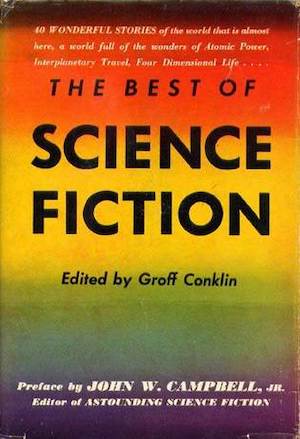
Conklin was a relentless anthologist. Selecting just one of his anthologies was difficult. I settled on The Best of Science Fiction because it’s a rarity: an SF anthology from the 1940s (when SF was generally relegated to the pulps). The Best of Science Fiction is notable also for its length: a majestic 785 pages in the original. Presumably, paper rationing was not a thing in the immediately post-war United States.
Back in 1946, there must have been a strong temptation to focus on works published in the dominant magazine of the day, Campbell’s Astounding. While Astounding is well represented in such stories as Cartmill’s “Deadline” (1944), and Heinlein’s “Blowups Happen,” Conklin draws from diverse other sources, some (like Gallun’s “Davey Jones’ Ambassador” from 1935) predating Campbell-era Astounding’s rise, and others—like Poe’s “A Tale of the Ragged Mountains” (1844) and Doyle’s “The Great Keinplatz Experiment” (1885)—predating American pulp-era SF entirely.
Imagination Unlimited edited by Everett F. Bleiler and T. E. Dikty (1952)
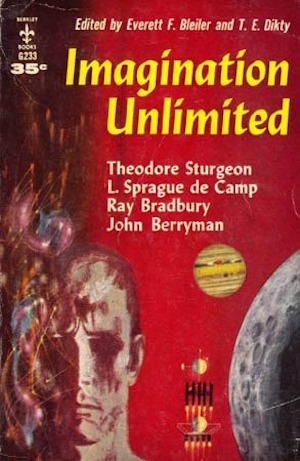
Considerably less of a chonky boi than The Best of Science Fiction, Imagination Unlimited offers thirteen stories drawn primarily but not exclusively from the pages of Astounding (whose dominance of the field was by 1953 no longer astounding but certainly not unknown). Familiar works such as Gallun’s “Old Faithful” and Neville’s “Hold Back Tomorrow”4 are featured, as well as works that may have slipped out of collective memory. Of historical note: “Dune Roller” is a very early Julian May piece; readers may be familiar with her much later Galactic Milieu series.
There was in those days (and may still be) a pretense that SF was in some sense a science-based genre. SF wasn’t just exciting but educational! Imagination Unlimited’s organization reflects this. The contents are sorted into four general categories:
- Mathematics and Philosophy
- Physical Sciences
- Biological Sciences
- Social Sciences
As someone who often spends as much time on structure as content, this approach delights me. That said, please don’t try to educate yourself by drawing entirely on genre sources.
Tomorrow, the Stars edited by “Robert A. Heinlein” (1952)
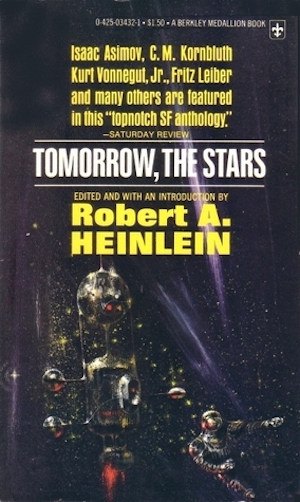
Under the “not all great anthologies are Groff Conklin anthologies” rule, I try to avoid mentioning editors or authors more than once per piece. However, the backstory for Tomorrow, the Stars is curious enough that I will waive it just this once. For marketing reasons, the anthology was credited to genre superstar Heinlein, but most of the actual editing was carried out by Frederik Pohl and Judith Merril. Consequently, there was a period in which “Robert A. Heinlein” was listed on ISFDB as one of Frederik Pohl’s pen names, which is both true and extremely misleading.
At 249 pages, Tomorrow, The Stars is thinner than the two anthologies mentioned above. However, it is a perfectly cromulent survey of predominantly but (thanks to 1941’s “Jay Score ”)5 not entirely post-war American SF. Fans of the period will spot familiar faces here (the authors of “Absalom,” “Betelgeuse Bridge,” and “Keyhole,” for example). Younger readers will find the anthology a solid introduction to the period.
Star Science Fiction Stories edited by Frederik Pohl (1953)
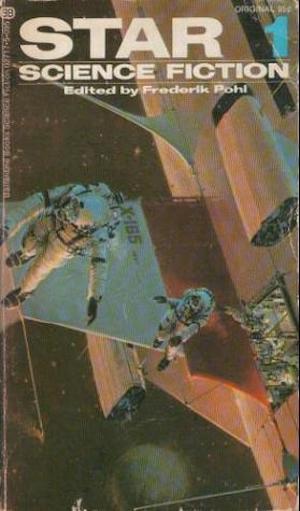
Although Frederik Pohl never explicitly states that this is an anthology of all original pieces6, perusal of the ISFDB indicates that it was exactly that. As magazines declined in importance following the deliberate destruction of the American News Company, original anthologies such as Orbit7 rose in importance. When Pohl inaugurated his Star anthologies, magazines were thriving, but (assuming I have not been misled by databases and missing pages) elected to draw on his editorial experience by acquiring original pieces.
The series ran from 1953 to 1959. I am reviewing just the first volume here; I think the others would also repay reading (or rereading). This volume includes an impressive array of classic stories, each accompanied by a short author bio. Note to future anthologists: I am a huge fan of ancillary commentary in collections and anthologies.
Perhaps the best-known story in the collection is Arthur C. Clarke’s “The Nine Billion Names of God,” a hard SF story in which the hard science in play is applied theology.
The Star series sold well enough to warrant reprinting at least seven times (I bought the copies with John Berkey covers rather than the original Richard Powers covers)8. In fact, I believe that this series inspired two later anthology series: Judy-Lynn del Rey’s disco era Stellar anthologies and Patrick Nielsen Hayden’s considerably more recent Starlight series.
SF: The Year’s Greatest Science Fiction and Fantasy edited by Judith Merril (1956)
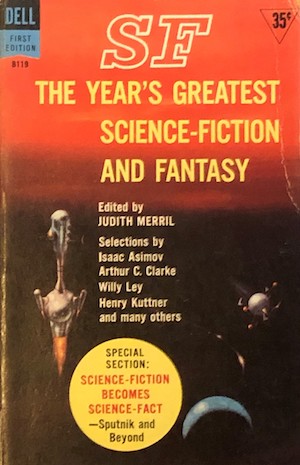
Although predated by Everett F. Bleiler and T. E. Dikty, Merril stands out as one of the pioneers of annual Best SF series. Moreover, she was for an astonishingly long time the only woman to have solo-helmed an annual Best SF. I may be overlooking someone, but I believe that Guran’s The Year’s Best Science Fiction & Fantasy Novellas: 2015 Edition might have been the first solo woman-helmed Best SF annual anthology to come out after Merril shuttered her series in the 1960s.9
Merril often ranged outside conventional genre boundaries, which may explain how it is her anthology features not merely an introduction by Orson Welles, but one of that Steve Allen’s speculative fiction stories as well. Perhaps the best-known story in the set is Shirley Jackson’s “One Ordinary Day, with Peanuts,” featuring a husband and wife whose hobbies are quite different while still complementary. Other stories in the volume will reward your attention, as well.
***
No doubt those of you who are not astonished to discover that there was a world before 1960, let alone one featuring an SF industry, have your own favourites not mentioned above. Perhaps I mentioned them in prior essays. Perhaps I have never heard of them. Either way, feel free to make a case for your favourites in the comments, which are, as ever, below.
In the words of fanfiction author Musty181, four-time Hugo finalist, prolific book reviewer, and perennial Darwin Award nominee James Davis Nicoll “looks like a default mii with glasses.” His work has appeared in Interzone, Publishers Weekly and Romantic Times as well as on his own websites, James Nicoll Reviews (where he is assisted by editor Karen Lofstrom and web person Adrienne L. Travis) and the 2021 and 2022 Aurora Award finalist Young People Read Old SFF (where he is assisted by web person Adrienne L. Travis). His Patreon can be found here.
[1]Fans/authors Walt Willis and James White met because both were in search of the few copies of American SF magazines that made it to Belfast.
[2]Limiting this essay to that period means I cannot even mention some anthologies that I remember fondly, such as Pohl & Pohl’s “Jupiter,” Pournelle’s “2020 Vision,” Asimov’s “The Hugo Winners, Volume One and Two,” Sargent’s “Women of Wonder,” Dann’s “Wandering Stars,” and Salmonson’s “Amazons”!
[3]The problem with reprinting old works is copyrights. Imagine the fun of trying to track down who owns a story whose author died generations ago but whose work is not yet in the public domain. And once stories are in the public domain, imagine trying to convince a publisher there’s a market for stories last printed during the Harding administration (1921–1923), or even earlier.
[4]Well, these stories are familiar to *me.* I suspect a lot of you know them too, but I cannot assume…
[5]“Jay Score” is a classic example of a genre that we might call “the despised minority character who showed they were basically ok by risking their life to save the narrator, who by the way is white and also male” genre. Russell’s stab at inclusion asserts that each race has to be included because each has race-specific abilities (thus, all space doctors are Black). Needless to say, this isn’t inclusion so much as a race-based caste system.
[6]My copy of “Star Science Fiction” has lost a few pages at the beginning, so it’s possible that one of those pages was a copyright page. I will never know if such a page, if it existed, would have acknowledged that any of the stories within had a prior publication history.
[7]The reason my cut-off date was 1960 for this essay was because I could not decide whether to recommend “Orbit 6” or “Orbit 7.” I then decided to avoid having to choose ANY Orbit by setting my cut-off date before the first “Orbit” was published in 1966.
[8]I own the “Star Science Fiction” volumes with Berkey covers *because* they have Berkey art. As a teen, I bought anything with a Berkey cover, regardless of author or publisher.
[9]Merril was exemplary in other fields. Why, I could write a whole piece about “five of judith merril’s boyfriends whose sf careers proved they were more than cute faces, unlike the disappointing husbands and boyfriends of other sf authors I could mention.” Her beaus included such impressive luminaries as—my editor is gesturing me over, no doubt to discuss an unrelated subject but before I leave, let me recommend Emily Pohl-Weary’s “Better to Have Loved: The Life of Judith Merril” for more details.











Oh man, I read so many Conklin anthologies in grade school! Also liked, although they came out a few years too late for this article, Kingsley Amis & Robert Conquest’s Spectrum five-book series.
I am embarrassed to admit Spectrum is new to me.
Long, long ago, I owned precisely that edition of Star Science Fiction Stories No. 1, with the Berkey cover, and read it many times. I have no idea where it went; I imagine the paper and cover parted company at some point and it made the journey to that great bookshelf in the sky.
Clarke’s ‘The Nine Billion Names of God’ was, of course, brilliant, but, for perhaps obvious reasons (given I was somewhere between 11 and 13), Fritz Leiber’s ‘The Night He Cried’ was definitely my favourite entry.
Ted Dikty, co-editor of Imagination etc, was also May’s husband, which I do not say unduly influenced his editorial choices but might have helped bring “Dune Roller” to his attention.
Someday I shall watch The Cremators, the film “Dune Roller” was adapted as. (May did not seem to have thought it a good adaptation – in A Pliocene Companion she mentions the existence of a film and also pointedly refuses to identify it.)
There was also a series of “Out of this world” (I think I have 1-5 somewhere) selected by (pause to fire up search engine) Amabel Williams-Ellis and Mably Owen. Hmm… I hadn’t realised there were at least ten of them!
This is a trip down memory lane for me; I own all of these, or at least others in the series. My favorite SF reading used to be shorter fiction. I really only started reading novels when I ran out of new shorter material. In retrospect, I’m not sure why that was, since I was happy to read novels in other genres.
I thought I had that Star anthology to check, but I don’t — though I do have five others in the series, including one containing three short novels (one by Jessamyn West!).
I loved the Groff Conklin anthologies, and scoured libraries, used bookstores, and garage sales for them. My favorite ones were Invaders of Earth and Giants Unleashed. I’ll admit I haven’t gone back to them in years; I hope the Suck Fairy hasn’t been at them too much.
I have just one of the anthologies you mention in this article, the Heinlein one. However, the one anthology I thought for sure would show up didn’t. Adventures in Time and Space. Just an amazing book.
I always liked the T.E. Dikty anthologies.
7: I only skipped Adventures because I’d mentioned it before.
7: Yeah, Healy and McComas is the go-to “Golden Age” antho for me; but also worthy of mention is their 1951 (I think) original antho — possibly the first such for SFF — New Tales of Space and Time, particularly noteworthy because it was the first publication of Boucher’s “The Quest for Saint Aquin” (Boucher also wrote an Introduction to the book). It also had a Papa Schimmelhorn story by R. Bretnor and stories by Bradbury, Asimov, van Vogt, P. Schuyler Miller, Kris Neville, and Cleve Cartmill — plus some folks I don’t frankly recall from anywhere else. Good stuff.
See also Anthopology 101 by Bud Webster, a collection of his essays on the history of SF anthologies as well as reviews. The book also contains articles for book collectors on collecting anthologies.
Please do Fantasy! Please do Horror!
Don’t forget “A Treasury of Great Science Fiction,” 2 volumes edited by Anthony Boucher. For those who got these think volumes from the Science Fiction Book Club, the 1,000 pages of classic stories (both short and novel length) were an introduction to the major SF writers of of the 40s and 50s.
Was a great fan of Fantasy and Science Fiction Magazine so this story really appealed to me. Speaking of covers – am I correct that I see a couple that might be by Ed Emshwiller? He was one of my favorites.
Back when I was a teen in the ’70s, there was a local library known for its summer book sales. On one such occasion, I was able to pick up a number of Gnome Press hardcovers for a song. One of them that made a lasting impression on me was a title called The Robot and the Man, edited by Martin Greenberg, which did not contain the usual robot stories of the time. The authors included Lester del Rey (two stories, neither of which are the one you probably think of when you think of him), Bernald Wolfe, Henry Kuttner and C. L. Moore, Ross D. MacDonald, Anthony Boucher, and others. Worth a look at…
#4: “Dune Roller” was also made into an episode of the early (1951-1953) television SF anthology “Tales of Tomorrow”,
The Science Fiction Hall of Fame vol 1 (edited by Robert Silverberg) introduced me to a ton of the classic era writers, and while many of the stories don’t stand the test of time, they had a really strong impact on me and my reading over the course of my life.
I read “Dune Roller” in the mid70s – I wonder if it was in Imagination Unlimited
The whole list could’ve been Conklin anthologies. He was prolific and he’s a neglected figure now despite really going to bat for preserving magazine SF.
I am also surprised not to see Adventures in Tim.come and Space, a true classic
To bring up Heinlen again, there’s a good anthology of all his short early period stories gathered in one place, before the related novels later.
Unfortunately I can’t remember the name off the top of my head
21 The Past Through Tomorrow?
Another vote for the 2-volume A Treasury of Great Science Fiction. I re-read both recently and most (not all) the stories hold up pretty well.
After an extended period of vision difficulties that robbed me of the pleasure of being able to read extensively, I am recovering my vision and that ability. SF was long a prime focus of my reading life and will again be that. Such a pleasure to see these older classics mentioned.
Just outside your cut-off, but one of the first adult SF books I read was Damon Knight’s A Century of Science Fiction. There was a copy, I recall, in my school library. They also had at least one volume of the Out of this World series.
As a kid who discovered science fiction in the 70s and read my way alphabetically through my local libraries collection, the anthologies that taught me the most about SF were Damon Knight’s Orbit anthologies and Terry Carr’s Universe anthologies. Those are where I discovered the authors I still love to this day.
“there are still some dangerous visions here that are worth exploring”
And note the reference to Dangerous Visions and Again, Dangerous Visions – but unfortunately published past the 1960 cutoff.
Great list! But how can we read these now?
Yes, I have the same question (#28). I checked my local library and they have exactly zero copies of any of these listed anthologies or any others from that era. The earliest shown in the catalog was from 2017. So other than scouring the used bookstores (not a bad pastime I grant), how does one obtain copies of these gems?
AbeBooks, Bookfinder, Ebay, and academic libraries if you have access to them.
Of all the older science fiction books available in ebook format, anthologies seem to be the rarest. Ellen Datlow has done a great job in keeping ebook editions of many of her anthologies available (I recently learned that I missed my chance to buy Black Feathers.). And I see that ReAnimus Press has issued ebooks of all nine of the Alpha anthologies that Robert Silverberg edited, which I highly recommend..
@17 same here but I guess it was past OP’s cutoff of 1960. It remains the most memorable anthology I can remember, read it at an impressionable age (borrowed from a senior) and almost all the stories were new to me at that time.
I mean – Flowers for Algernon, Surface Tension, Nightfall, 9 Billion Names of God, and a whole bunch of other awesomeness, all in one volume? My sense of wonder was overloaded for a week :)
One I’ve always enjoyed is The Science Fiction Carnival, a collection of humorous SF stories. Nothing deep or award winning but some of them are pretty funny, if dated.
@@@@@#27:
And let’s not forget The Last Dangerous Visions, which Jo Walton memorably reviewed on this site. (@@@@@anyone who reads the review: first check the date on it!)
The Internet Archive has anthologies from the 1950s by all of these folks, if not necessarily the ones listed. (Plus Judith Merril’s England Swings SF from 1968, a classic now probably more dated than the older books but still fun to read). You can also find the complete “Adventures in Time and Space” and “A Treasury of Great Science Fiction.” And, hundreds of other anthologies and collections and in many cases the magazines the stories appeared in originally.
All of the Merril anthologies were remarkable for how widely she must have read to find the many not-sold-as-genre stories — and the genre stories tended not to be conventional, as most of Conklin’s selections were.
@13: that anthology was my first thought on seeing the title. It’s certainly one of the most successful ones, having been offered for decades by SFBC; I read my first copy to pieces and was lucky enough to get a library copy that someone had decided was surplus to requirements. Volume 2 was one of the first books I read that came from the general shelves instead of the YA shelves; encountering Bester at age 12 was something else.
@25: a great selection — my first exposure to both Sherred and McKenna, who wrote little but made all of it count.
@28/@29: in some parts of the world there are SF clubs with respectable libraries and a policy of not getting rid of material just because it isn’t being taken out. (Boston has MITSFS and NESFA.) Find the nearest club and ask other people what they know; it may be cheaper than mail-order, especially if you’re OK with reading and returning.
Orbit 6 or Orbit 7?? I can only conclude that that means you haven’t read Orbit 4.
I have in fact read _all_ of them.
https://jamesdavisnicoll.com/reviews/project/damon-knight
I could have sworn “The Nine Billion Names of God” was in Playboy, but apparently not.
Respect!
“Dune Roller” captured my attention for a long while, but not from an SF anthology—it was an Alfred Hitchcock collection! Odd that the line that won’t desert my head is “It was wintergreen. He hated wintergreen.”
Brian Aldiss ed two volume Galactic Empire’s
“no longer astounding but certainly not unknown.”
I see what you did there [both _Astounding_ and _Unknown_ being excellent magazines of the period].
I’d been reading SFF for several years, mostly in Galaxy, Amazing & Fantastic, but it is accurate to say that Anthony Boucher’s 1959 2 volume anthology A Treasury of Great Science Fiction really opened up the field for me. I got it from the SFBC. In addition to short stories, it included some novels such as The Stars My Destination, and it was where I first read that great work. It also included The Weapon Shops of Isher, and it was the first time I’d read that.
The other anthology that transformed my relationship with the field was Judith Merril’s England Swings SF, as a couple of comments mentioned. Although it came out in 1968, I didn’t get it until Ace put out a paperback edition in 1970. It is fair to say that NO other book (not even Dangerous Visions) transformed my relationship with the field so much. My eyes turned across The Atlantic, and with a few exceptions (Gene Wolfe, Connie Willis), I’ve never looked back. The last Worldcon that I attended was Glasgow in 2005. I’d already read 4/5 Hugo nominated novels before they got nominated, and read the 5th (Jonathan Strange and Mr. Norrell) after it got nominated but before it won. I loved the Susanna Clarke, but I’d loved all 5 of them and voted for River of Gods. That’s the only time in my history that I’d read the majority of the Hugo nominated novels of my own intent, and not (with that 1 exception) because they’d been nominated. Guest of Honor Chris Priest is a real favorite. I think that I owe ALL of that to Judith Merril.
In the 1990s, it was a catalog. Mark V. Ziesing’s catalog introduced me to Australian SF, and I’ve been a big fan ever since. Perhaps one day, I’ll get to a Worldcon down under.